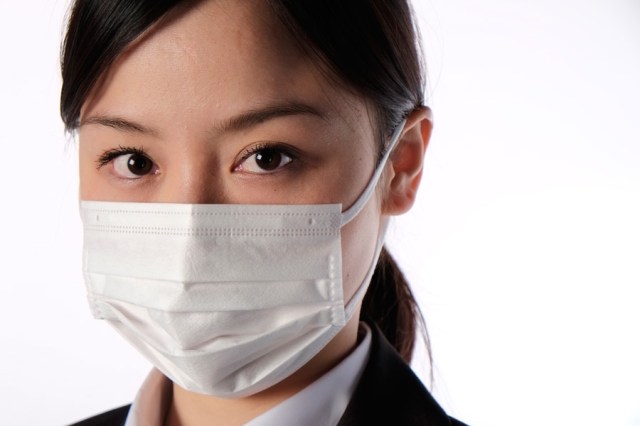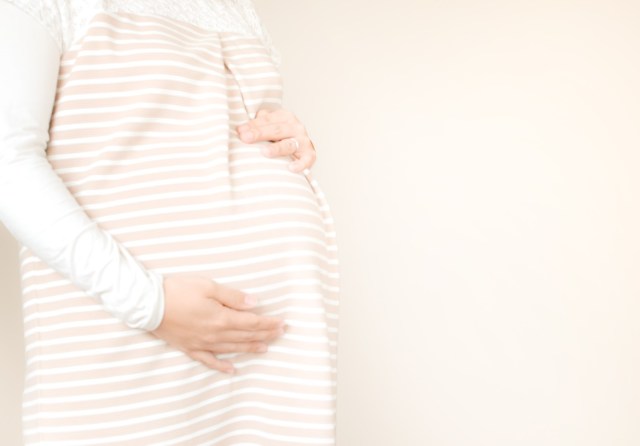
Not exactly the protection we were looking for.
Ever since the novel coronavirus began making news at the beginning of the year, masks have become almost as valuable as real-world currency, with people going to great lengths to stockpile them, resell them, and purchase them at exorbitant prices.
The government has put a number of measures in place to try and alleviate the resulting mask shortage, by enacting a mask resale ban with prison time for violators, and spending 46.6 billion yen (US$432 million) to send out two reusable cloth face masks to every household in the country.
The Ministry of Health, Labor and Welfare is also stepping up to help provide people with cloth masks, specifically pregnant women, who have been receiving them with the Maternity Health Record book issued by their local municipality. According to a number of municipalities, though, the masks have been arriving with defects like hair and stains on them.
The Ministry of Health, Labor and Welfare made the admission on 18 April, saying they had received 1,901 reports of defective masks from 80 municipalities. About 500,000 cloth masks for pregnant women were posted nationwide from 14 April, but a number of them were reported to be discoloured and found to have hair in them.
The ministry has asked municipalities to refrain from distributing the defective products, saying they will be replaced with new ones.
A representative from the ministry says 19.3 million cloth masks were already distributed to nursing homes around the country. To date, reported defects include one case of hair found in a mask given to a nursing home and one case of insects found in another, which was sent out as part of the distribution to elementary, junior high and special needs schools.
While details regarding the type of insect found and the cause of the dirt-like stains weren’t revealed, the Ministry of Health, Labor and Welfare says they have asked the four manufacturers who produced the masks to thoroughly inspect and review their production systems.
They also say the cloth masks being sent to general households as part of the national government’s nationwide distribution scheme, which began on 17 April, are undergoing thorough visual inspection checks to ensure the possibility of defective products is reduced.
Given the flack the Abe government has received over the two-mask distribution plan, they certainly don’t need the added problem of defective masks to inspire more memes on the Internet.
Source: Hachima Kiko
Featured image: Gahag
Insert images: Pakutaso, Gahag
● Want to hear about SoraNews24’s latest articles as soon as they’re published? Follow us on Facebook and Twitter!



 Mask rules in Japan have changed…so are people still wearing them?
Mask rules in Japan have changed…so are people still wearing them? We tried washing our “Abe masks” in the washing machine to see how they hold up
We tried washing our “Abe masks” in the washing machine to see how they hold up Free Sailor Moon condoms to be given out by Japanese government
Free Sailor Moon condoms to be given out by Japanese government Easier anime work visa requirements for foreign students being considered by Japanese government
Easier anime work visa requirements for foreign students being considered by Japanese government COVID-19 appears to be suppressing the flu in Japan, number of cases down and decreasing
COVID-19 appears to be suppressing the flu in Japan, number of cases down and decreasing Japan’s new difficult-to-drink-from beer glass protects your liver, but it’s a brutal experience
Japan’s new difficult-to-drink-from beer glass protects your liver, but it’s a brutal experience Hello, cosmetics! Clinique teams up with Hello Kitty this summer for first-time collaboration
Hello, cosmetics! Clinique teams up with Hello Kitty this summer for first-time collaboration How to order snacks on a Shinkansen bullet train in Japan
How to order snacks on a Shinkansen bullet train in Japan Demon Slayer: Kimetsu no Yaiba gets new roller coaster attractions and food at Universal Studios Japan
Demon Slayer: Kimetsu no Yaiba gets new roller coaster attractions and food at Universal Studios Japan New samurai glasses are Japan’s latest weird must-have souvenir
New samurai glasses are Japan’s latest weird must-have souvenir Burger King Japan suddenly adds Dr. Pepper and Dr. Pepper floats to its menu nationwide
Burger King Japan suddenly adds Dr. Pepper and Dr. Pepper floats to its menu nationwide New Nintendo Lego kit is a beautiful piece of moving pixel art of Mario and Yoshi【Photos】
New Nintendo Lego kit is a beautiful piece of moving pixel art of Mario and Yoshi【Photos】 What do you eat when you catch a cold? We asked 11 of our Japanese reporters
What do you eat when you catch a cold? We asked 11 of our Japanese reporters High-fashion Totoro cuddle purse is like an elegant stroll in the forest【Photos】
High-fashion Totoro cuddle purse is like an elegant stroll in the forest【Photos】 Why Japanese doesn’t need swear words
Why Japanese doesn’t need swear words Nintendo history you can feel – Super NES, N64, and GameCube controllers become capsule toys
Nintendo history you can feel – Super NES, N64, and GameCube controllers become capsule toys “The most Delicious Cup Noodle in history” – Japan’s French Cup Noodle wins our heart【Taste test】
“The most Delicious Cup Noodle in history” – Japan’s French Cup Noodle wins our heart【Taste test】 Starbucks releases a cute Frappuccino and Unicorn Cake…but not in Japan
Starbucks releases a cute Frappuccino and Unicorn Cake…but not in Japan Kyoto Tower mascot termination reveals dark side behind cute Japanese characters
Kyoto Tower mascot termination reveals dark side behind cute Japanese characters McDonald’s Japan’s Soft Twist Tower: A phantom ice cream only sold at select branches
McDonald’s Japan’s Soft Twist Tower: A phantom ice cream only sold at select branches Yabai Ramen: What makes this Japanese ramen so dangerous?
Yabai Ramen: What makes this Japanese ramen so dangerous? Finally! Nintendo Japan expands Switch 8-bit controller sales to everybody, Online member or not
Finally! Nintendo Japan expands Switch 8-bit controller sales to everybody, Online member or not Japanese government wants to build luxury resorts in all national parks for foreign tourists
Japanese government wants to build luxury resorts in all national parks for foreign tourists To combat declining birth rate, Japan to begin offering “Breeding Visas” to foreigners
To combat declining birth rate, Japan to begin offering “Breeding Visas” to foreigners 10 things you should buy at 7-Eleven in Japan
10 things you should buy at 7-Eleven in Japan Studio Ghibli releases anime heroine cosplay dresses that are super comfy to wear
Studio Ghibli releases anime heroine cosplay dresses that are super comfy to wear Woman charged for driving suitcase without a license in Osaka
Woman charged for driving suitcase without a license in Osaka Studio Ghibli unveils My Neighbour Totoro miniature house model
Studio Ghibli unveils My Neighbour Totoro miniature house model Kyoto experiencing problems with foreign tourists not paying for bus fares, but not on purpose
Kyoto experiencing problems with foreign tourists not paying for bus fares, but not on purpose Fighting mild hunger with a Japanese soda that turns into jelly in the stomach【Taste test】
Fighting mild hunger with a Japanese soda that turns into jelly in the stomach【Taste test】 Studio Ghibli’s Howl’s Moving Castle tapestry unveiled in Japan for first time
Studio Ghibli’s Howl’s Moving Castle tapestry unveiled in Japan for first time McDonald’s new Happy Meals offer up cute and practical Sanrio lifestyle goods
McDonald’s new Happy Meals offer up cute and practical Sanrio lifestyle goods Sales of Japan’s most convenient train ticket/shopping payment cards suspended indefinitely
Sales of Japan’s most convenient train ticket/shopping payment cards suspended indefinitely Sold-out Studio Ghibli desktop humidifiers are back so Totoro can help you through the dry season
Sold-out Studio Ghibli desktop humidifiers are back so Totoro can help you through the dry season Japanese government to make first change to romanization spelling rules since the 1950s
Japanese government to make first change to romanization spelling rules since the 1950s Foreigner’s request for help in Tokyo makes us sad for the state of society
Foreigner’s request for help in Tokyo makes us sad for the state of society Ghibli founders Toshio Suzuki and Hayao Miyazaki contribute to Japanese whisky Totoro label design
Ghibli founders Toshio Suzuki and Hayao Miyazaki contribute to Japanese whisky Totoro label design Doraemon found buried at sea as scene from 1993 anime becomes real life【Photos】
Doraemon found buried at sea as scene from 1993 anime becomes real life【Photos】 Tokyo’s most famous Starbucks is closed
Tokyo’s most famous Starbucks is closed Princesses, fruits, and blacksmiths: Study reveals the 30 most unusual family names in Japan
Princesses, fruits, and blacksmiths: Study reveals the 30 most unusual family names in Japan Chinese people hand out free surgical masks in Japan as coronavirus outbreak continues【Video】
Chinese people hand out free surgical masks in Japan as coronavirus outbreak continues【Video】 Japanese tapioca bubble tea shops are suddenly becoming face mask shops
Japanese tapioca bubble tea shops are suddenly becoming face mask shops Survey by Japanese ministry reveals high rates of “maternity harassment” in workplace
Survey by Japanese ministry reveals high rates of “maternity harassment” in workplace Japanese ministry finds correlation between level of income and diet, number of teeth
Japanese ministry finds correlation between level of income and diet, number of teeth Government study finds only 3,065 homeless people in Japan
Government study finds only 3,065 homeless people in Japan Nearly five percent of Japanese are addicted to gambling – even though it’s still “illegal”
Nearly five percent of Japanese are addicted to gambling – even though it’s still “illegal” Government survey finds teleworking at least once per week raises Japanese worker happiness level
Government survey finds teleworking at least once per week raises Japanese worker happiness level Japanese company creates face masks for musicians
Japanese company creates face masks for musicians Japan’s population of people over 100 surpasses 90,000 for first time
Japan’s population of people over 100 surpasses 90,000 for first time Japanese government may encourage people to reuse masks as coronavirus-caused shortage continues
Japanese government may encourage people to reuse masks as coronavirus-caused shortage continues Japanese PM asks schools around Japan to close as coronavirus cases rise
Japanese PM asks schools around Japan to close as coronavirus cases rise Nintendo takes steps to protect staff from growing problem of customer harassment
Nintendo takes steps to protect staff from growing problem of customer harassment Lace Bra face masks go on sale in Japan, immediately sell out【Photos】
Lace Bra face masks go on sale in Japan, immediately sell out【Photos】 Instant ramen with 40 billion lactic acid bacteria on sale now
Instant ramen with 40 billion lactic acid bacteria on sale now Google Maps sent us to a forbidden exit from one of Tokyo’s major subway stations
Google Maps sent us to a forbidden exit from one of Tokyo’s major subway stations
Leave a Reply